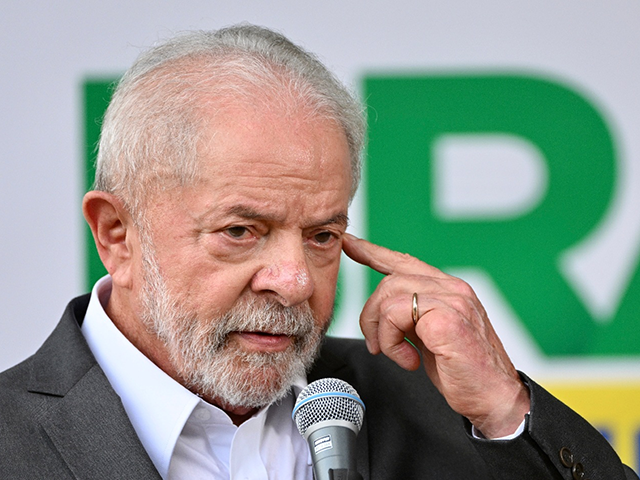Brazilian radical leftist President Luiz Inácio Lula da Silva made calls on Wednesday for the South American trade bloc Mercosur, which Brazil helped establish, to “urgently” seal a long-awaited trade deal with the European Union so that it can move on to the same with communist China.
“We are going to intensify our discussions with the European Union and sign that agreement so that we can immediately discuss an agreement between China and Mercosur,” Lula da Silva said. “I think it’s possible.”
The Brazilian president made his statements during a joint press conference with centrist Uruguayan President Luis Lacalle Pou as part of his official visit to Uruguay. Uruguay has been independently negotiating a prospective free trade agreement with China since 2021, reaching a feasibility agreement with the Asian communist nation in July 2022.
Lula da Silva met Lacalle Pou intending to dissuade his government from reaching a deal with China on its own over a joint Mercosur agreement with China.
“We want to sit down as Mercosur and discuss with our Chinese friends the Mercosur-China agreement,” Lula added.
Mercosur is a South American economic and political bloc founded in 1991 by Argentina, Brazil, Paraguay, and Uruguay, with other regional countries acting as associate states. Venezuela formally joined Mercosur in 2012 but was suspended in 2016 in response to the socialist regime’s gross human rights abuses and violations of the bloc’s trade rules under dictator Nicolás Maduro.
Mercosur and the European Union completed talks for a trade agreement in 2019. The talks led to no established agreement because E.U. leaders expressed “environmental concerns” over the provisions discussed. The parliaments of every one of the European Union’s 27 countries must approve the deal for it to go into effect.
In addition to negotiations towards a prospective free trade deal with China, Uruguay has been attempting to join the Trans-Pacific Partnership. The other members of Mercosur have not reacted positively to the plans, objecting to them as violations of the bloc’s founding statutes.
“Lacalle’s claims are more than fair,” Lula said. “It is fair to want to produce more and sell more. An increasing openness to other peoples is important. We fully agree with the Mercosur idea of innovation.”
During the joint press conference, Lacalle Pou clarified that his country will remain a member of Mercosur but stressed that, in his vision, changes have to be made to make Mercosur “modern, flexible and open to the world.”
“In conclusion, Uruguay has its dialogues with China, Brazil will surely deepen and initiate other paths, and we will get together and say: Uruguay has come this far, we are going to negotiate all together, or Brazil will say, this is what we can offer to Mercosur, and Uruguay agrees,” he added.
Lula’s advocacy on behalf of Beijing follows Chinese dictator Xi Jinping’s address this week to the member states of the left-leaning Community of Latin American and Caribbean States (CELAC). In the video speech to those assembled in Argentina, the Chinese dictator urged CELAC member states to embrace China’s predatory Belt and Road Initiative (BRI), a project in which China offers predatory loans to poor countries.
“More and more countries in the region have engaged in high-quality Belt and Road cooperation with China, supported and participated in the Global Development Initiative and the Global Security Initiative, and are working with China in building a China-LAC community with a shared future,” Xi stated.
Three of the four founding members of Mercosur have kept close ties with China. The sole exception is Paraguay, which maintains diplomatic relations with Taiwan. In the case of Argentina, the South American nation joined China’s Belt and Road Initiative in February 2022. China recently granted a $5 billion currency swap extension to Argentina in November to help ease its severe shortage of foreign reserves.
In a joint press conference on Monday featuring Argentine Economy Minister Sergio Massa and his Brazilian peer, Fernando Haddad, at CELAC, Massa referred to Uruguay — the smallest country in Mercosur — as one of the bloc’s “younger brothers” and, as such, assured that “Brazil and Argentina have the responsibility of taking care of it, like every younger brother.”
President Lacalle responded to the Argentine minister’s statements shortly afterwards by simply stating that they “look like Disneyland.”
Both Brazil’s president and Argentina’s leftist President Alberto Fernández recently expressed their intention to begin the proceedings for the creation of a new regional common currency, tentatively called the “Sur” (South) to reduce the region’s reliance on the United States dollar.
Christian K. Caruzo is a Venezuelan writer and documents life under socialism. You can follow him on Twitter here.

COMMENTS
Please let us know if you're having issues with commenting.